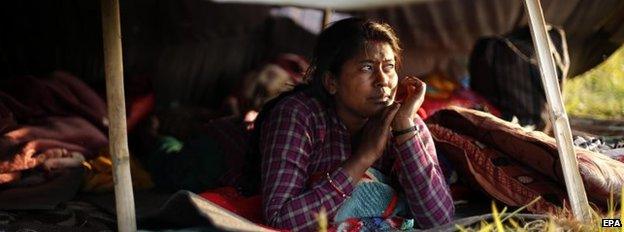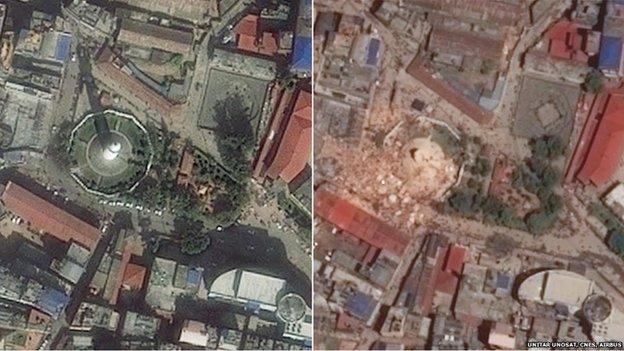Nepal earthquake: Eight million people affected, UN says
- Published
The BBC's Justin Rowlatt was on the first flight to Gorkha, near the quake's epicentre
Eight million people have been affected by the massive earthquake in Nepal - more than a quarter of the country's population - the United Nations says.
International aid has started arriving but there is still huge need - 1.4 million require food aid, the UN said.
The 7.8-magnitude quake hit Nepal on Saturday destroying buildings in Kathmandu and severely affecting rural areas across the region.
The death toll has risen to 4,310, with almost 8,000 injured, officials say.
But Prime Minister Sushil Koirala has warned the toll could reach 10,000, telling Reuters news agency the government was on a "war footing".
Nepal and surrounding areas have continued to experience aftershocks. Thousands in Kathmandu, Nepal's capital, spent a third night outside, too afraid to go back into their houses.
Water, food and electricity are in short supply and there are fears of outbreaks of disease.
"According to initial estimations and based on the latest earthquake intensity mapping, eight million people in 39 districts have been affected, of which over two million people live in the 11 severely affected districts," said the most recent report, external from the UN Office of the Resident Co-ordinator.
Drone footage showed the devastation in Kathmandu
The situation is critical in the remote rural regions towards the epicentre of Saturday's quake.
Rebecca McAteer, an American doctor who was one of the first to arrive in the district of Gorkha close to the epicentre, told Associated Press that 90% of houses there were "just flattened".
She said most residents were older men and women and children, as the younger men had left to find work elsewhere.
Many have also lost livestock and have little food.
A district official, Surya Mohan Adhikari, told AP that villages around the epicentre were very difficult to reach - cut off by landslides - and that bad weather was hampering helicopter access.

At the scene: Sanjoy Majumder, Lainchaur temporary camp, Kathmandu

This camp had been set up on a playground and even now there are quite a few children playing. But it no longer resembles a safe place. There's rubbish everywhere, paper plates, wrappers and plastic glasses are strewn all over.
"It's getting quite bad," says one man who is here with his wife and four daughters. "We've been here for three days and we've been living on instant noodles. There's nothing else to eat."
His house is not badly damaged, but he is adamant that he will not go home despite the challenging conditions in the camp.
"We've heard all these rumours about more earthquakes and aftershocks. We will not leave this place, not for a while."

The Nepal government has pleaded for overseas aid - everything from blankets and helicopters to doctors and drivers.
"We urge foreign countries to give us special relief materials and medical teams. We are really desperate for more foreign expertise to pull through this crisis," said Chief Secretary Leela Mani Paudel.
Many countries have sent aid including India, China, the UK and US.
But there is a logjam at Kathmandu airport, with individuals trying to fly out of the country while flights of aid and rescue teams wait to land.
On Monday, four Indian air force aircraft had to return to Delhi international airport after encountering "congestion" at Kathmandu, tweeted a spokesman for India's defence ministry, external.


Before and after pictures of Nepal show the extent of the devastation

Almost the entire Nepali army and police have joined the search and rescue operations, officials say.
People are still being pulled from the rubble more than 50 hours after the tragedy.
Journalists around Nepal share their view of the devastation wreaked by the earthquake
Hospitals are unable to cope with the huge numbers of people in need of medical attention and some Nepalis have complained of aid being slow to reach them.
The country's most deadly earthquake in 81 years triggered avalanches that have killed 18 people on Mount Everest - the worst disaster in history on the world's highest peak.
More than 200 people had been trapped on the mountain but reports now suggest all the injured have been evacuated, along with the dead.
Expedition leader Chris Harling described experiencing the quake on the north side of Everest, telling the BBC the camp "started to vibrate underneath us which increased in intensity up to the point where the ground was literally shaking backwards and forwards like a giant jelly.
"It was absolutely incredible."


Are you in the area? Are you affected by the earthquake? If it is safe to do so, you can share your story by emailing haveyoursay@bbc.co.uk, external
If you are willing to speak with a BBC journalist, please leave a contact number.
You can send a picture, video or message to our WhatsApp number +44 7525 900971
You can email your pictures, video or audio to us at yourpics@bbc.co.uk, external
You can upload pictures , external